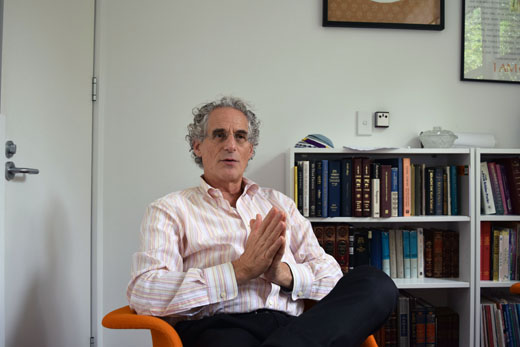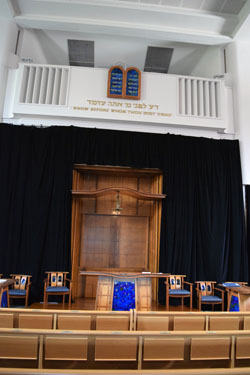
Editor’s Note: This is the third in a series of stories researched during Don and Nancy Harrison’s 50th Wedding Anniversary cruise from Sydney, Australia, to San Diego. Previous installments of the series, which runs every Thursday, may be found by tapping the number of the installment: 1, 2.
By Donald H. Harrison

SYDNEY, Australia – Growing up in the San Fernando Valley of Los Angeles, Rabbi Jeffrey Kamins followed a course many a California Jewish parent dreams about for their son. He went to Stanford University as an undergraduate, and then went to Boalt Hall at UC-Berkeley to attain his law degree. Clearly, he was following in the footsteps of his attorney father.
Although Kamins’ mother sang in the choir of Valley Beth Shalom, a Conservative congregation, the Kamins family was happily secular. For the rest of the family attending synagogue services seemed superfluous; who needs to go to temple when you could get plenty of Jewish atmosphere just by walking around the Encino neighborhood in which Kamins grew up?
But Kamins’ secular bubble began to burst while he was at Stanford and the Six Day War of 1967 broke out in the Middle East. Not everyone was Jewish, Kamins realized, and not everyone cared deeply about whether Israel continued to exist or not.
After the war, he went to Israel on a two-week visit, and “I felt that I was at home,” he said.
During college and law school, there were more visits to Israel including stays at two kibbutzim in the western section of the Upper Negev, adjacent to the Gaza Strip. “I loved the idea of being a Socialist farmer, but I also needed more independence,” he said. He completed law school, and then he met Bobette Abramson, who became his wife. Her father had been the president of a synagogue in Shreveport, Louisiana, and “I was very passionate about Israel and she was the only person who understood that. One thing led to another, and I started learning with her,” the rabbi recalled.
“I was 26 when I read from the Torah for the first time – so that was my bar mitzvah—and thirteen times two is Gematria for the name of God. I hated being a lawyer and this Judaism thing and this Israel thing were becoming more of a passion, so I quit my practice to see what would happen next. I decided to study to become a rabbi. I had met only a few rabbis up to that time, but I had been going to synagogue (with Bobette) for about a year and a half at that time. There were other pieces in the puzzle, including the fact that I have always been a deeply spiritual person and finally found the language to express that, which is Judaism.”
So he enrolled at Hebrew Union College, studying at the Reform institution’s campuses in Los Angeles, Cincinnati, and Jerusalem. He was ordained in 1989, and was married to Bobette. After rabbis receive ordination, they often meet recruiters from various congregations. Such was the case for Kamins, who met in Cincinnati with Rabbi Brian Fox and the president of Temple Emanuel, as the synagogue in Sydney then was called.
“The year before they recruited but they hadn’t been able to get anybody,” Kamins recalled. “Their rabbi was desperate to get someone.” Rather than play coy, the rabbi and president told Kamins straightforwardly what their situation was. They flew him to Sydney and for five days wined and dined him and showed him the city. Rabbi Fox had just begun a day school for non-Orthodox Jews, and starting that up was taking most of his attention. The problem for Kamins was that Sydney is such a long way from Los Angeles—a 15 hour flight—and it cost $2 per minute to make international phone calls then in the days before Skype and Facetime.
But he and Bobette decided to try Sydney out for two years, and, “it was amazing,” Kamins said. “I came in and I was able to hit the ground running. I did everything. Spoke from the pulpit, made hospital visits, and shared with Cantor Michael Deutsch, the bar and bat mitzvah program. I also started three different adult education programs, edited the congregation’s newsletters, did the Melton lectures … and two years became five, then five became ten, and I became the senior rabbi when Rabbi Fox retired.”
Kamins’ wife, Bobette, died after they had been separated, but “still were good friends.”

Now on the verge of marking his 30th year in Sydney, Kamins notes as one of his proudest achievements guiding the evolution of Temple Emanuel from a Reform congregation to a pluralistic one, with separate spaces for both Reform and Conservative services with provisions as well for Jewish Renewal services. Along the way, the congregation changed its name from Temple Emanuel to Emanuel Synagogue – the difference between the two being that whereas Reform theology is that the “Temple” can be anywhere that Jews settle, Conservatives reserve that name for the ancient Temple in Jerusalem that was destroyed by the Romans in 70 CE. “It’s not that I want the Temple to be rebuilt, but it was an ideal representation of being a house of prayer for all people. The Temple is a memory, an aspiration, in the sense of peace and harmony.”
This year, 2018, marks the 80th anniversary of the congregation, which was founded by Max Schenk in 1938, an ardent Zionist. “Ten years into his career, the State of Israel was founded, and a lot of Australians are under the influence of the British crown, including some Jews here, so there was a lot of tension over his pro-Zionist, anti-British stance.” Schenk left in 1948, the year of Israel’s creation. He was succeeded by Rabbi Rudi Brasch, a German Jew who had authored numerous books on Judaism and was particularly active in interfaith work. In 1952, Cantor Deutsch joined the synagogue and, according to the congregation’s website, he was the “heart and soul of the Emanuel community for over 50 years, not only for his magnificent voice, but also his guiding three generations through significant moments in their lives.”
Fox, a New Zealander, served the congregation from 1979 to 1999, founding not only the Emanuel Day School but also helping to establish the Netzer Jewish youth organization in Australia.
Today, as senior rabbi, Kamins typically leads the Progressive services while his associate rabbi, Rabbi Jacqueline Ninio, Emanuel’s first Australian born and also first woman rabbi, leads the Conservative services. According to the congregational website, “she has an absolute commitment to social justice and inclusion, and spearheaded Emanuel’s embrace of the LGBTQ community.”
The synagogue also actively advocates for the environment, welcoming refugees and the homeless, and protecting animals. Growing from 1,800 to 3,600 people (approximately 1,600 families), the congregation has added two members of the clergy: Rabbi Rafi Kaiserblueth and Reverend Sam Zwarenstein.
“On the one hand, while we embrace tradition, we also have been the champions for marriage equality, and have done many commitment ceremonies,” said Kamins. “Now that we can call them marriages, we do that – and we haven’t lost any congregants over that. The reason is that we did it slowly, gradually—so not only is the congregation with us, but so is most of the Jewish community.”
The rabbi disclosed that more than as a religion, he thinks of Judaism as a way of life. “There is no such thing as a Reform way to do a hospital visit, or a Conservative way to teach a class. We are Jews teaching Judaism. As an Israeli ambassador to Australia once said, ‘it’s about unity not uniformity.”
Nevertheless, while Kamins has “fine relations on a personal level” with Sydney’s Orthodox rabbinate and Chabad rabbis, “the problem is on the institutional level. They won’t officiate with me at any event, not at a funeral, not at weddings.”
As Emanuel Synagogue’s senior rabbi, Kamins often is called upon to participate in interfaith events, including attendance at functions featuring Great Britain’s Chief Rabbi Jonathan Sachs, and the former head of the Roman Catholic Church, Pope Benedict.
The rabbi also crosses paths with various political figures, including former Prime Minister Paul Keating and the current Prime Minister Malcolm Turnbull, whom he has lobbied on issues affecting the environment. There is one Jewish Member of Parliament, Julian Leeser.
As a political advocate, Kamins describes himself as left of center, perhaps farther left than a California Democrat. “We came from a pretty left family,” he said. “That comes out in my comments about refugees, social justice, even Israel.” While he considers himself a Zionist, he does not hesitate to criticize Israeli policies he believes are wrong.
Five years ago, Kamins married an Australian-born woman, Caroline, who calls herself “Caz,” following the Australian tradition of abbreviating almost everything. Her grandparents were benefactors of the community who helped to found Temple Emanuel, Kamins said. “She is more left than I am,” Kamins declared. “She keeps me really honest.”
*
Harrison is editor of San Diego Jewish World. He may be contacted via donald.harrison@sdjewishworld.com
Pingback: Australia celebrates Jewish general’s memory | San Diego Jewish World
Pingback: The Jewish victims in an Australian tragedy | San Diego Jewish World